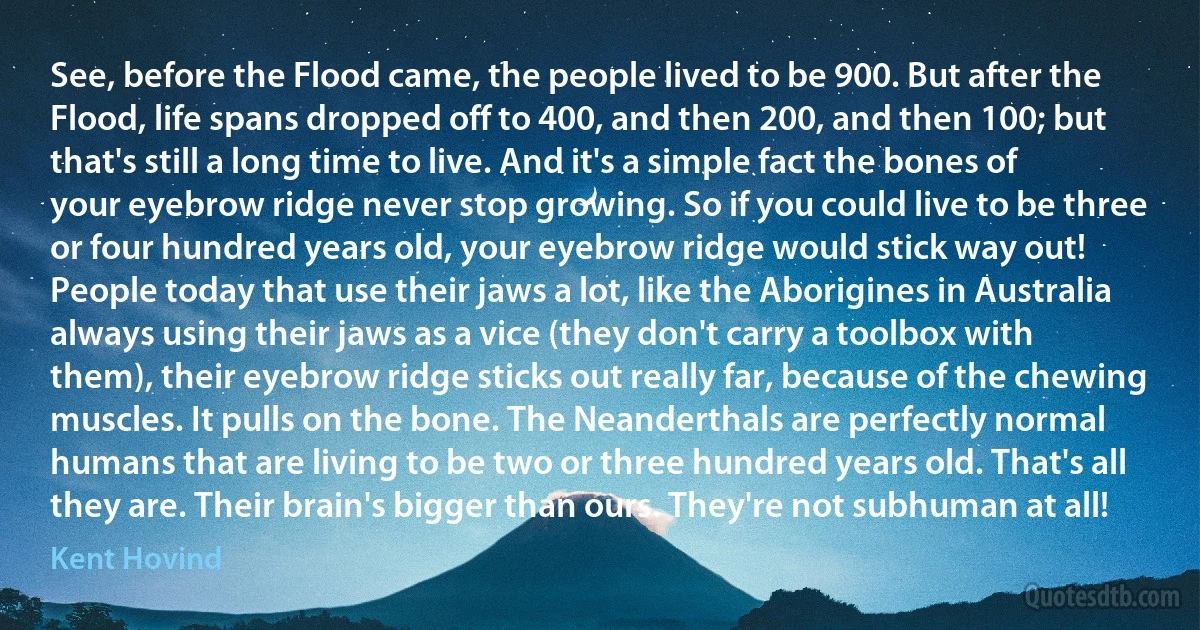
See, before the Flood came, the people lived to be 900. But after the Flood, life spans dropped off to 400, and then 200, and then 100; but that's still a long time to live. And it's a simple fact the bones of your eyebrow ridge never stop growing. So if you could live to be three or four hundred years old, your eyebrow ridge would stick way out! People today that use their jaws a lot, like the Aborigines in Australia always using their jaws as a vice (they don't carry a toolbox with them), their eyebrow ridge sticks out really far, because of the chewing muscles. It pulls on the bone. The Neanderthals are perfectly normal humans that are living to be two or three hundred years old. That's all they are. Their brain's bigger than ours. They're not subhuman at all!
Kent HovindRelated topics
bone came carry drop far flood four growing hundred life living live off people see simple stick stop three time use using vice way 100 today years australia bones 900 sticks subhuman toolboxRelated quotes
Let us imagine that the aboriginal-original human specimen was one of two brother apes, A and B; they were alike in every respect; both were animal space-binders; but something strange happened to B; he became the first time-binder, a human. ... He had thus a new faculty, he belonged to a new dimension; but, of course, he did not realize it; and because he had this new capacity he was able to analyze his brother "A"; he observed "A is my brother; he is an animal; but he is my brother; therefore, I AM AN ANIMAL." This fatal first conclusion, reached by false analogy, by neglecting a fact, has been the chief source of human woe for half a million years and it still survives. ... He [then] said to himself, "If I am an animal there is also in me something higher, a spark of some thing supernatural."

Alfred Korzybski
We shall not flag or fail. We shall go on to the end. We shall fight in France, we shall fight on the seas and the oceans, we shall fight with growing confidence and growing strength in the air, we shall defend our island, whatever the cost may be. We shall fight on the beaches, we shall fight on the landing grounds, we shall fight in the fields and in the streets, we shall fight in the hills we shall never surrender.... And if, which I do not for a moment believe, this island or a large part of it were subjugated and starving, then our empires beyond the seas, armed and guarded by the British Fleet, will carry on the fight, until in Gods own time the new world in its power and might steps forth to the rescue and liberation of the old.

Winston Churchill
If you have weapons, take them home; if you do not have them, please do not seek to get them. We cannot solve this problem through retaliatory violence. We must meet violence with nonviolence. Remember the words of Jesus: «He who lives by the sword will perish by the sword.» We must love our white brothers, no matter what they do to us. We must make them know that we love them. Jesus still cries out in words that echo across the centuries: «Love your enemies; bless them that curse you; pray for them that despitefully use you.» This is what we must live by. We must meet hate with love. Remember, if I am stopped, this movement will not stop, because God is with the movement. Go home with this glowing faith and this radiant assurance.

Martin Luther King Jr.
At present, I am particularly excited by 'bad taste'. I have the deep feeling that there exists in the very essence of bad taste a power capable of creating those things situated far beyond what is traditionally termed 'The Work of Art'. I wish to play with human feeling, with its 'morbidity' in a cold and ferocious manner. Only very recently I have become a sort of gravedigger of art (oddly enough, I am using the very terms of my enemies). Some of my latest works have been coffins and tombs. During the same time I succeeded in painting with fire, using particularly powerful and searing gas flames, some of them measuring three to four meters high. I use these to bathe the surface of the painting in such a way that it registered the spontaneous trace of fire.

Yves Klein
[P]eople misunderstand Israel, and see it now in colonial, imperialist terms is because it's a unique event in human history. The British colonization of North America, New Zealand, Australia, the Dutch in South Africa, they came to places that they had never been to. That's colonialism. You put your people in there. You takeover. You marginalize the natives if you can. You may not succeed. In South Africa, that's colonialism. So they see the Jews arriving in what's called Palestine, and that's the parallel, the only one they understand. They can't put their heads around the fact that this is a people returning to their home. That they never gave up title to. They never gave up their longing for. It was repeated in their rituals three times a day, it wasn't like once a year, let's remember the homeland.

Charles Krauthammer
